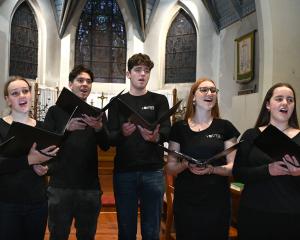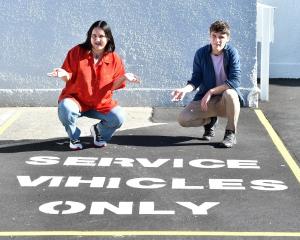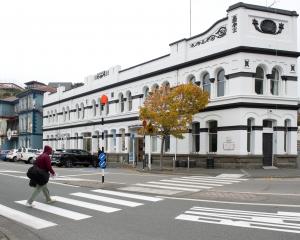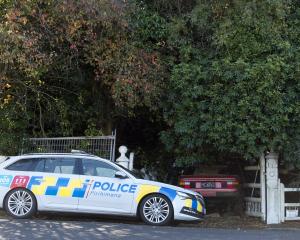The man who stood in the way of Dunedin's campus area descending ''into chaos'' has retired after 14 years at the University of Otago.
David Richardson (67) retired from the position of director of student services last week, after an action-packed tenure, which included tackling a growing ''reputation issue'' that threatened the university's future in the 2000s when chaotic scenes from the Undie 500 were beamed around the country.
His work on that front brought high praise from vice-chancellor Prof Harlene Hayne who commented on Mr Richardson's retirement on the university's Otago Bulletin website.
''The only reason that the whole place doesn't descend into chaos is because people like David Richardson organise a small army of highly dedicated staff who stand steady and ready - guarding our students from harm, gently pushing back when necessary, providing support as required, and celebrating what is so life-affirming about young people,'' Prof Hayne told the Otago Bulletin.
Asked to respond to Prof Hayne's praise, Mr Richardson said she was being ''very generous''.
''It's more than just one person and it's more than just my team. It's a wider group of the whole university buying into what we are on about here,'' he said.
As student services director he was responsible for nearly 1000 staff and his role went far beyond dealing with student misbehaviour and included overseeing everything from student health to the University Union and ID card services.
But coming up with a response to riots and behavioural problems in North Dunedin was an issue that ''consumed'' his life for a period in the 2000s.
That changes needed to be made was immediately clear to Mr Richardson, who took up the job after moving from Alexandra, where he was principal of Dunstan High School.
''Coming in as a high school principal, it was crystal clear to me that `Man, this wouldn't happen in my school'.''
The need for a shift became clearer in the 2000s, when couch fires, riots and scenes of drunken chaos in North Dunedin began making national headlines and causing concern among parents of would-be students.
''The university suddenly had a reputation issue and a future that was potentially at risk.''
The response would require a change in direction from the university, which took on a more hands-on approach.
''At that stage, it was a case of what happens outside the university's door was not the university's business.''
The hands-on approach led to the introduction of a student code of conduct in 2007, which allowed the university to kick out students who seriously misbehaved.
One of the solutions he helped come up with was the introduction of Campus Watch in 2007, an idea that was ''unique'' to Otago University.
It came with an annual cost of about $1 million and its introduction was controversial at the time, but Mr Richardson believed it and other measures had helped transform the situation in North Dunedin.
''It was a big investment for the university to make, and a gamble in a way.''
But improving the situation was more than just about the ''big picture''. It was also about making sure individuals did not ''fall through the cracks''.
This involved having the staff to follow up and speak to students the next day after Campus Watch helped them home after they overindulged.
There was only a tiny minority of students who were in the ''wrong place''.
''Ninety-nine percent of the students I have dealt with at this university are just the most wonderful young people that, as an older person now, gives me huge confidence that I will get old in a society that will be well managed and well led.''
He rejected allegations the university had killed scarfie culture, saying it was about minimising the risk and not stopping the fun.
''There were always some people who said that, because there were always some people who saw things like the Undie 500 as a good thing to have.''
One of the things he was most proud of was being involved in efforts to improve the performance of Maori and Pacific Island students.
He was looking forward to ticking a few items off his ''bucket list'', which included going on a world trip later this year.
In a statement provided to the Otago Daily Times, Prof Hayne said Mr Richardson had made an important contribution to a change in culture at the university.
''Although Castle St and Hyde St still have their moments, our students are increasingly devoting themselves to more productive extracurricular activities.
''How times have changed,'' she said.












